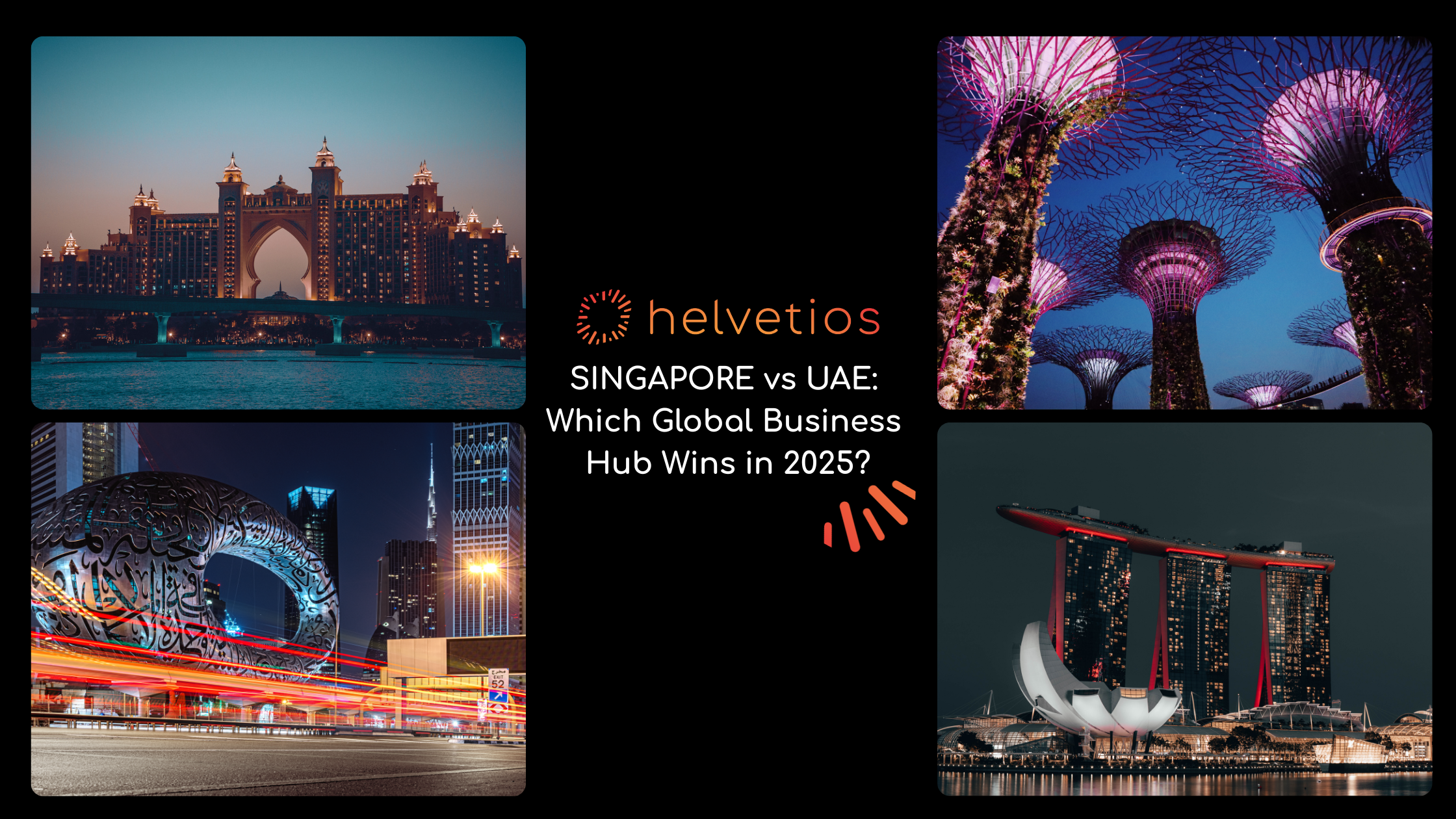Introduction: The Global Entrepreneur’s Dilemma – Singapore or UAE?
In the dynamic landscape of international business, selecting the right jurisdiction for your company isn’t just a matter of compliance; it’s a strategic decision that can shape your growth trajectory, tax liabilities, and market reach. For global entrepreneurs eyeing robust economies, pro-business environments, and strategic geographic advantages, two powerhouses consistently rise to the top: Singapore and the United Arab Emirates (UAE), particularly its bustling hub, Dubai.
Singapore, consistently ranked as one of the easiest places to do business globally and a leading financial center in Asia, offers unparalleled stability and a sophisticated ecosystem. Meanwhile, the UAE, with Dubai at its forefront, continues its rapid economic diversification, boasting world-class infrastructure, over 40 specialized Free Zones, and a pivotal role as the gateway to the MENA, African, and Asian markets.
Both nations offer compelling reasons to establish a presence, from attractive tax regimes to world-class infrastructure.
But which one aligns best with your specific business goals in 2025?
We at Helvetios.eu understand this critical choice. This article provides a head-to-head comparison, delving into the nuances of company registration, tax implications, market access, and operational realities in Singapore and the UAE, empowering you to make an informed decision for your venture.
Executive Summary: Quick Compare – Singapore vs. UAE
| Feature | Singapore | UAE (Dubai Focus) |
| Ease of Setup | Highly efficient, fully digital, 1-3 days | Very efficient, especially in Free Zones (1-3 days) |
| Primary Structures | Private Limited Company (Pte. Ltd.) | Mainland (LLC), Free Zone, Offshore |
| Foreign Ownership | 100% permitted | 100% permitted (esp. Free Zones & most Mainland) |
| Corporate Tax | Flat 17% (with partial exemptions for new companies) | 9% (on profits > AED 375k); 0% for most Free Zone ops |
| VAT/GST | 9% GST | 5% VAT |
| Capital Gains/Dividends | Generally 0% | Generally 0% |
| Market Access | Gateway to ASEAN & Asia-Pacific | Gateway to MENA, Africa, Asia |
| Repatriation | 100% allowed | 100% allowed |
| Residency Requirement | No resident shareholder; 1 resident director | No resident shareholder; resident visa possible |
| Key Appeal | Stability, rule of law, IP protection, R&D, Asian hub | Rapid growth, diverse Free Zones, lifestyle, MENA hub |
The Lure of Each Hub: Why Choose Singapore? Why Choose UAE?
Both Singapore and the UAE have meticulously cultivated environments conducive to international business, but their unique strengths cater to different strategic priorities.
Why Singapore Remains a Global Favorite:
- Unrivaled Stability & Rule of Law: Consistently ranked among the world’s most politically and economically stable nations with a robust legal framework.
- Gateway to Asia-Pacific: Provides unparalleled access to ASEAN markets and beyond, making it ideal for regional headquarters.
- Attractive Corporate Tax Incentives: Low headline corporate tax rate of 17%, coupled with generous partial tax exemptions for qualifying new companies.
- Strong Intellectual Property Protection: A global leader in IP rights enforcement, crucial for innovative businesses.
- Skilled & Multilingual Workforce: A highly educated talent pool fluent in English and other major Asian languages.
- Digital-First Approach: Highly digitized government services and business processes ensure efficiency.
Why the UAE (Dubai) is Surging as a Business Magnet:
- Rapid Economic Growth & Diversification: A dynamic economy moving beyond oil, fostering innovation in tech, tourism, logistics, and finance.
- Strategic MENA & African Gateway: Positioned perfectly for businesses targeting the Middle East, Africa, and parts of Asia.
- Diverse Free Zones with Unique Benefits: Over 40 Free Zones, each with specific industry focuses, offering 100% foreign ownership, 0% corporate tax (for qualifying activities), and full profit repatriation.
- Modern Infrastructure & Connectivity: World-class airports, ports, and urban infrastructure support seamless global operations.
- Tax-Efficient Environment: Despite the new 9% corporate tax, it remains highly competitive, especially with 0% tax for most Free Zone operations and no personal income tax.
- Vibrant Expat Community & Lifestyle: A highly attractive destination for global talent, offering a high quality of life.
Head-to-Head Comparison: Diving Deeper
Let’s break down the key factors to consider when deciding between Singapore and the UAE.
1. Business Environment & Ease of Doing Business
- Singapore: Consistently praised for its regulatory transparency, efficiency, and lack of corruption. Processes are highly streamlined and digital. Historically a top-ranked nation for ease of doing business.
- UAE: Has made significant strides in improving its business environment, particularly in Free Zones, which offer highly efficient setup processes. The recent allowing of 100% foreign ownership on the Mainland further boosts its appeal. Both are highly competitive.
2. Legal Structures & Ownership
- Singapore: The Private Limited Company (Pte. Ltd.) is the standard and most recommended structure for foreign investors. It offers limited liability, separate legal personality, and 100% foreign ownership is permitted.
- UAE: Offers three main structures:
- Mainland Company: Registered with the DED of an Emirate. Offers 100% foreign ownership for most activities post-2021 reforms, allowing direct engagement with the local market.
- Free Zone Company: Registered within a specific Free Zone (e.g., DMCC, JAFZA, DIFC). Offers 100% foreign ownership, specific industry focus, and unique tax benefits. Ideal for international trade and services.
- Offshore Company: Used for international activities outside the UAE. Offers full ownership and tax exemptions, typically without a physical presence.
3. Taxation
- Singapore:
- Corporate Income Tax: Flat 17%. New companies can enjoy up to 75% exemption on the first S100,000oftaxableincomeand50100,000 for the first three years.
- GST (Goods & Services Tax): 9%.
- Capital Gains/Dividends: Generally 0% on capital gains and dividends received.
- Double Taxation Agreements: Extensive network of over 90 DTAs.
- UAE:
- Corporate Income Tax: 9% on taxable profits exceeding AED 375,000 (introduced June 2023). However, most Free Zone companies maintaining substance and generating income solely from Free Zone or foreign activities can benefit from a 0% corporate tax rate.
- VAT (Value Added Tax): 5%.
- Personal Income Tax: Still 0%.
- Capital Gains/Dividends: Generally 0% on capital gains and dividends.
- Double Taxation Agreements: Extensive network of over 100 DTAs.
4. Market Access & Connectivity
- Singapore: Your direct gateway to the thriving ASEAN market (Indonesia, Malaysia, Philippines, Thailand, Vietnam, etc.) and the broader Asia-Pacific region. Its deep trade ties with China, India, and Australia are a significant advantage.
- UAE: Your strategic entry point to the MENA (Middle East & North Africa) region, as well as excellent connectivity to Africa and parts of Asia. It serves as a vital re-export and logistics hub.
5. Residency & Visa Options
- Singapore: A Singapore company does not automatically grant residency. To reside, you generally need an Employment Pass (EP) or EntrePass, which requires meeting salary thresholds and other criteria. A resident director is required for incorporation (can be a nominee).
- UAE: Company setup in the UAE, especially in Free Zones, often facilitates obtaining a resident visa for shareholders and employees, making it easier to relocate. While not mandatory to reside, the visa process is generally more integrated with company setup than in Singapore.
6. Banking & Financial Infrastructure
- Singapore: Boasts a highly reputable, stable, and sophisticated banking sector with global banks. Known for strict compliance and robust anti-money laundering (AML) regulations.
- UAE: Rapidly developing financial sector with local and international banks. Free Zones like DIFC are dedicated financial hubs. Account opening can be more streamlined for companies with clear physical presence and substance.
7. Compliance & Substance Requirements
- Singapore: Strict but clear compliance framework. Companies must adhere to ACRA (Accounting and Corporate Regulatory Authority) regulations, appoint a qualified company secretary, and meet annual filing requirements.
- UAE: Compliance is evolving. Companies (especially Free Zone entities) must adhere to Economic Substance Regulations (ESR) if they conduct “Relevant Activities” to demonstrate genuine activity in the UAE. Ultimate Beneficial Ownership (UBO) declarations are also mandatory.
8. Cost of Doing Business
- Incorporation Costs: Both jurisdictions offer competitive incorporation fees. UAE Free Zone costs can vary widely depending on the chosen Free Zone and license type, sometimes appearing higher initially due to visa quotas and office requirements. Singapore is generally more straightforward in its fee structure.
- Operational Costs: Both are relatively high-cost locations compared to developing countries, especially for office rent and skilled labor. Singapore’s cost of living and commercial rent can be higher than in many parts of the UAE, though this varies significantly within the UAE depending on the Emirate and specific location (e.g., Dubai vs. Ajman).
Who Should Choose Which? Tailoring Your Decision
While both hubs are exceptional, their distinct characteristics make them more suitable for certain types of businesses:
Choose Singapore if:
- Your primary market is Asia-Pacific or ASEAN.
- You prioritize political stability, legal certainty, and IP protection above all else.
- Your business involves high-value services, technology, finance, or R&D.
- You seek a reputable, transparent, and highly efficient jurisdiction for global operations.
- You are comfortable with a robust regulatory environment.
Choose UAE (Dubai) if:
- Your primary market is the MENA region, Africa, or Central Asia.
- You are seeking rapid market growth and a dynamic, diverse environment.
- You want the flexibility of 100% foreign ownership with 0% corporate tax within a Free Zone (for qualifying activities).
- Your business heavily relies on international trade, logistics, tourism, or specific Free Zone industries.
- You plan to relocate founders/employees and seek a straightforward visa process.
Conclusion: Your Strategic Partner for Global Expansion
The decision between Singapore and the UAE is not about which is “better” in absolute terms, but which is “better for you.” Both jurisdictions offer phenomenal opportunities for international businesses in 2025. Your choice should align with your core business activities, target markets, operational model, and long-term strategic vision.
Navigating the intricacies of company formation, legal structures, tax implications, and ongoing compliance in either region requires specialized knowledge. That’s where Helvetios.eu comes in. As your dedicated partner, we provide expert guidance, streamline the incorporation process, and ensure your business is set up for success, whether you choose the precision of Singapore or the dynamism of the UAE.
Frequently Asked Questions (FAQs)
1. Is Singapore or UAE more tax-efficient for a new international business? Both offer highly competitive tax environments. The UAE, particularly its Free Zones, can offer 0% corporate tax for qualifying activities, while Singapore offers a 17% flat rate with generous exemptions for new companies. The “most” efficient depends on your profit levels, source of income, and whether your activities qualify for Free Zone benefits in the UAE.
2. Which jurisdiction is easier for foreigners to get a business visa/residency? The UAE generally has a more integrated and straightforward process for obtaining resident visas for founders and employees through company setup, especially within its Free Zones. Singapore requires meeting specific criteria for Employment Passes (EP) or EntrePasses, which can be more stringent depending on salary and qualifications.
3. Do I need to be physically present to set up a company in Singapore or UAE? For both Singapore and the UAE, it is possible to initiate and complete the company registration process remotely with the assistance of a professional service provider like Helvetios.eu. While a physical visit may be required for bank account opening in some cases, remote options or assisted processes are often available.
4. How does the market access differ between Singapore and UAE? Singapore is the premier gateway to the ASEAN and broader Asia-Pacific markets, with strong trade links across the region. The UAE, particularly Dubai, is the strategic hub for accessing the Middle East & North Africa (MENA) region, as well as serving as a vital trade link to Africa and parts of Asia. Your target customer base should guide this decision.
5. Are there any hidden costs I should be aware of? While both jurisdictions are transparent, unexpected costs can arise from not understanding all requirements. These might include annual license renewal fees, mandatory audit fees (if applicable), visa sponsorship costs, office space requirements (even virtual), and ongoing compliance fees. Helvetios.eu provides clear breakdowns to avoid surprises.
6. Which country has better privacy for business owners? Both countries operate under robust legal frameworks. While historically certain offshore structures offered higher levels of privacy, both Singapore and the UAE now have regulations (like Ultimate Beneficial Ownership – UBO declarations and Economic Substance Regulations – ESR) aimed at increasing transparency. Neither jurisdiction offers “secret” company ownership; compliance is key.
This article has been fact-checked using official government sources including IRAS (Singapore) and UAE Ministry of Finance data as of 2025. Tax rates and regulations are subject to change, and professional advice should be sought for specific situations.









